'The present government swears by Hinduism. But we lost three of our sants during earlier BJP regimes.'
Rashme Sehgal reports.
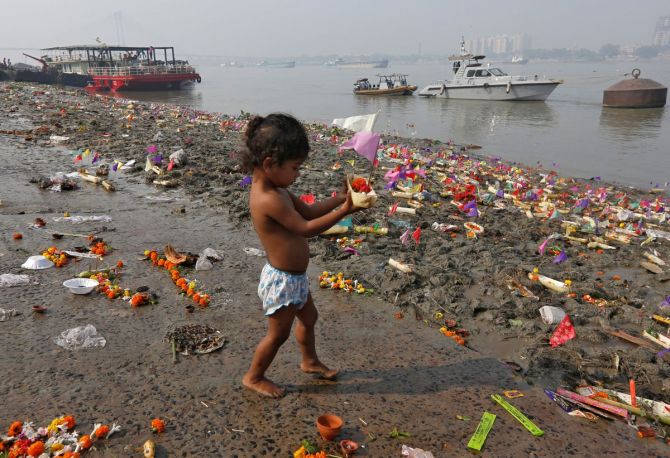
Matri Sadan, or the Home of the Mother, in Haridwar has emerged as the nerve centre to clean the Ganga and ensure its aviral or uninterrupted flow.
For the last eleven years, the sants living in Matri Sadan have been fasting to achieve this objective.
Three of these sants have laid down their lives to ensure the purity of India's most revered river.
Matri Sadan lost young Swami Nigmanand Saraswati in 2011, Baba Nag Nath in 2013 and environmentalist Swami Sanand (Professor G D Agarwal) who died in October 2018.
All three undertook fasts unto death in the hope that their sacrifice would be heeded by the government and steps would be taken to clean Ganga.
The only parallel that can be drawn anywhere in the world of monks willing to sacrifice their lives for a cause was in the mid-sixties of the last century, when Buddhist monks had launched an agitation against the corrupt oligarchic president of South Vietnam, who was trying to force Roman Catholicism on a largely Buddhist population.
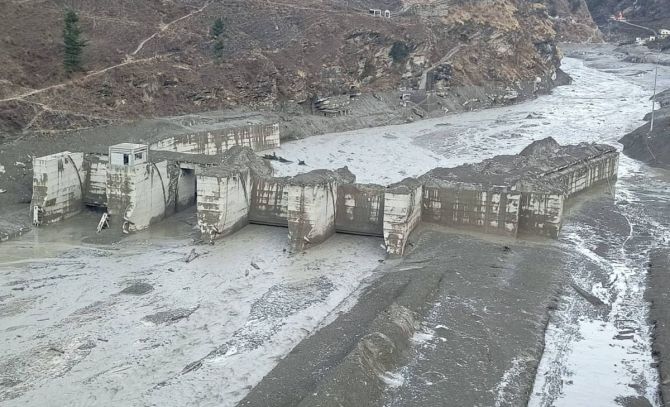
On September 13 this year, young Swami Atmabodhanand, a computer engineer by training, joined this select band by going on an indefinite fast if demands to stop sand and gravel mining on the Ganga as also halt a number of hydel electric projects being constructed on the river.
Sadly, his fast has not created even a ripple in the corrupt politician-real estate lobby presently governing Uttarakhand who are determined to push through several hydel electric projects even when these have been found to be scientifically unfeasible.
The people living in Haridwar seem equally indifferent.
"We locals admire their single-pointed focus, but it is for the state government to come forward and initiate some action," says Ram Lal, who runs a grocery shop in Kankhal where Matri Sadan is located.
White bearded and a fierce looking Swami Sivanand, who has a post graduate degree in chemistry, heads Matri Sadan. He refuses to get drawn into any controversy regarding the efficacy of such fasts.
"We are sants. This is the tool available to us. We regard the Ganga as our mother. We are willing to sacrifice our lives for the sake of our mother," said Swami Sivanand.
"The present government swears by Hinduism. But we lost three of our sants during earlier BJP regimes," says Swami Sivanand, adding, " It was the Congress government alone who addressed our concerns and it was then environment minister Jairam Ramesh who conceded our demands to declare the districts of Chamoli, Bageshwar and Pithoragrah as part of the Nanda Devi Biosphere because many of the Ganga"s tributaries emerge from there."
The fasting Swami Atmabodhanand is also demanding an immediate ban on four hydroelectric projects in Uttarakhand -- Tapovan Vishnugad (520 MW), Vishnugad Pipalkoti (444 MW), Singoli Bhatwari (99 MW) and Phata Byung (76 MW).
The environment ministry insists that many of these projects are half complete and already a great deal of money has been spent on their construction.
The environment ministry had also recently recommended the construction of three other hydro electic projects which include Tehri II (1000 MW), Madhmaheshwar (15 MW) and Kaliganga II (4.5 MW).
Dr Ravi Chopra, a leading environmental scientist heading the People's Science Institute along with 59 scientists and activists recently wrote to the prime minister demanding that this decision be immediately revoked especially since the expert committee formed at the behest of the Supreme Court and headed by him found several shortcomings with these hydroelectric projects.
"The entire geo morphology of the rivers on which these dams are being built has changed from the time the plans were first visualised," says Dr Chopra. "The bed slope of the river has changed as has the catchment of the river. These rivers are now full of sediment. Even the Dhauli Ganga river is full of sediment following the major landslide," he says.
The reference is to the Chamoli landslide in February 2021, which destroyed two hydroelectric projects and killed 200 people.
Dr Chopra also warns against the building of hydro-electric projects in para-glacial zones as the tributaries flowing in these unstable regions can prove more destructive than the main rivers.
Both the Madhmaheshwar and Kaliganga rivers are clogged with sediment.
This sediment is likely to get mobilised during extreme hydro meteorological events and likely to impact the Singoli-Bhatwari hydro-electric project, whose barrage is located barely few 200 metres below the confluence of the Madhmaheshwar Ganga with the Mandakini river.
"All these projects need to be redesigned as these are fresh projects and not 50 per cent complete as are being claimed by the bureaucrats and engineers." adds Dr Chopra.
He also expressed his reservation on the Tehri 2 hydro-electric project. "It"s a pump storage project expected to regenerate electricity during the peak power consumption period in order to raise revenues. The problem is that these projects have a long gestation period," Dr Chopra points out.
Given climate change, the environment in these regions can alter dramatically between the time the programme is designed and its execution.
Supporting their argument, the experts wrote to the prime minister that 'in the recent Chamoli flashflood disaster, the Rishi Ganga hydro-electric project was wiped out in minutes by the flooding in the Rishiganga river. Tapovan-Vishnugad and its tunnels were buried under tonnes of debris minutes later and still remain in a deplorable condition.'
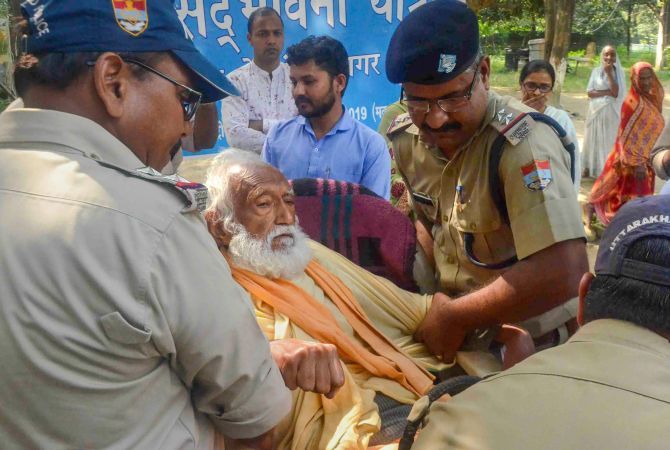
The key question is why do these warnings by experts and scientists continue to go unheeded despite the fact that Uttarakhand has seen a series of disasters which have left thousands dead and disabled.
"No one sitting in Delhi is suffering because of these disasters. Also, we have a government which left to itself would dismantle all regulations as they seem hell bent on pushing these projects all over India. There is also the arrogance of our planners and engineers who believe they can overcome all local environmental constrainsts," maintains Dr Chopra.
The sadhus of Matri Sadan have been fasting for eleven years now.
The BJP government, which swears by religiosity, has shown little concern or sympathy for them.
No attempt has been made to hold a serious dialogue with them despite the tremendous sacrifice they are incurring.
Professor G D Aggarwal (Swami Sanand) had a doctorate from the University of Berkeley and taught at IIT-Kanpur. Then prime minister Indira Gandhi hand picked him to head the newly set up Central Pollution Control Board.
His fast-unto-death stretched for 111 days having died on October 11 2018.
During the last weeks of his life, Swami Sanand had whittled his demands to two key subjects.
The first demand was that the three hydroprojects on the Bhagirathi, Alaknanda and the Mandakini rivers be canceled.
His second was the setting up of an autonomous Ganga Bhakti Parishad that would ensure the flow of the river.
He wrote four letters to Modi and would have broken his fast if he had received an assurance from the prime minister.
Sadly, this was not the case.
Uma Bharti persuaded Professor Aggarwal during his fast to talk to then water resources minister Nitin Gadkari in August 2018, two months before his death.
When he told Gadkari that the rivers were part of nature"s cycle and if their natural flow was not restricted they would be able to clean themselves, Gadkari ended the phone call.
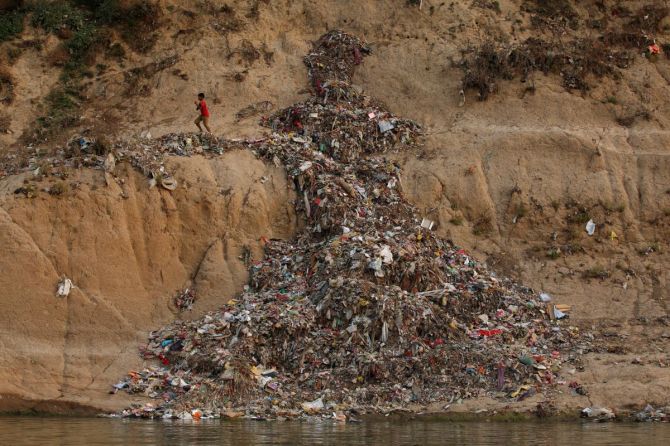
The sadhus of Matri Sadan are driven by a rare sense of idealism. They lead extremely ascetic lives as can be seen by the simple huts which dot their ashram.
These are a stark contrast to the lavish five star ashrams that dot the skyline of Haridwar and are run by high flying swamis who have no concern for their surroundings or for the Ganga.
The biggest problem facing the sadhus at the Matri Sadan is the lack of support for them in their immediate surroundings and in Haridwar in general.
In fact, there has been a lack of political mobilisation across the country on crucial environment issues.
Unlike the protesting farmers who have been sitting on dharna for the last ten months, these sadhus are fighting a lone battle for the future of our rivers.
Sadly, except for some activists and outspoken villagers in Uttarakhand who speak out in their favour, they have not been able to create enough pressure on the bureaucracy and the political class to heed the issue which is of crucial importance for our water security.
As Dr Ravi Chopra says, "The present government is only willing to negotiate with those people who accept their neo liberal economic model of growth. This reflects their sheer cussedness."
Feature Presentation: Aslam Hunani/Rediff.com

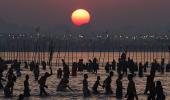








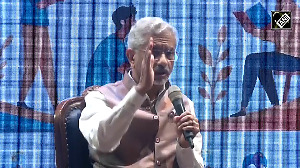
 © 2025
© 2025